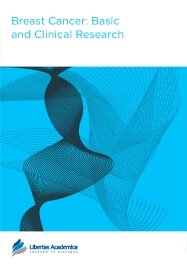

Publication Date: 24 May 2010
Type: Short Report
Journal: Breast Cancer: Basic and Clinical Research
doi: 10.4137/BCBCR.S0

Among women, the most prevalent type of cancer is breast cancer, affecting 1 out of every 8 women in the United States; in Puerto Rico, 70 out of every 100,000 will develop some type of breast cancer. Therefore, a better understanding of the potential risk factors for breast cancer could lead to the development of early detection tools. A gene that has been proposed as a risk factor in several populations around the world is Apolipoprotein E (apoE). ApoE functions as a mechanism of transport for lipoproteins and cholesterol throughout the body, with 3 main isoforms present in humans (apoE2, apoE3, and apoE4). Whether or not apoE4 is a risk factor for breast cancer remains controversial. Previous studies have either included test subjects of all ages (20–80) or have focused on late-onset (after age 50) breast cancer; none has concentrated specifically on early-onset (aged 50 and younger) breast cancer. The objectives of this study was to examine (in a Puerto Rican population) the differences in the relative frequency of occurrence of apoE4 in non-breast cancer versus breast cancer patients and to examine, as well, the potential differences of same in early- versus late-onset patients. We found an increased frequency of apoE4 (odds ratio 2.15) only in early-onset breast cancer survivors, which is similar to the findings of those studies that combined or adjusted for age as well as for an association between apoE4 and decreased tumor size. ApoE is also a potential risk factor for long-term cognitive effects after chemotherapy and affects response to hormone replacement. Our data supports the theory that knowing the apoE genotype of women who are at risk of developing breast cancer may be beneficial, as such knowledge would aid in the prediction of tumor size and the development of treatment regimens.
PDF (505.46 KB PDF FORMAT)
RIS citation (ENDNOTE, REFERENCE MANAGER, PROCITE, REFWORKS)
BibTex citation (BIBDESK, LATEX)
XML
PMC HTML

The submission process for manuscript publication in Breast Cancer: Basic and Clinical Research is as easy as A,B,C! Any minor hiccups I encountered were quickly addressed by Libertas' expert staff via prompt emails, and the timelines between initial submission and publication are surely the shortest on record! I will definitely be submitting future manuscripts to this journal, and look forward to working with their professional and expert team.

All authors are surveyed after their articles are published. Authors are asked to rate their experience in a variety of areas, and their responses help us to monitor our performance. Presented here are their responses in some key areas. No 'poor' or 'very poor' responses were received; these are represented in the 'other' category.See Our Results
Copyright © 2013 Libertas Academica Ltd (except open access articles and accompanying metadata and supplementary files.)
FacebookGoogle+Twitter
PinterestTumblrYouTube